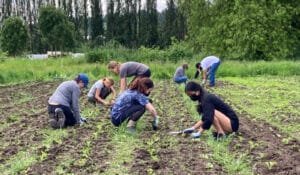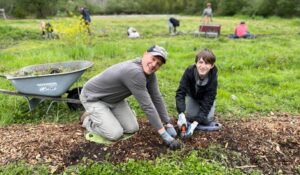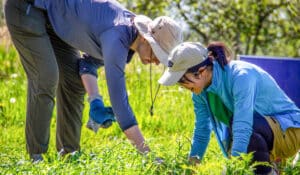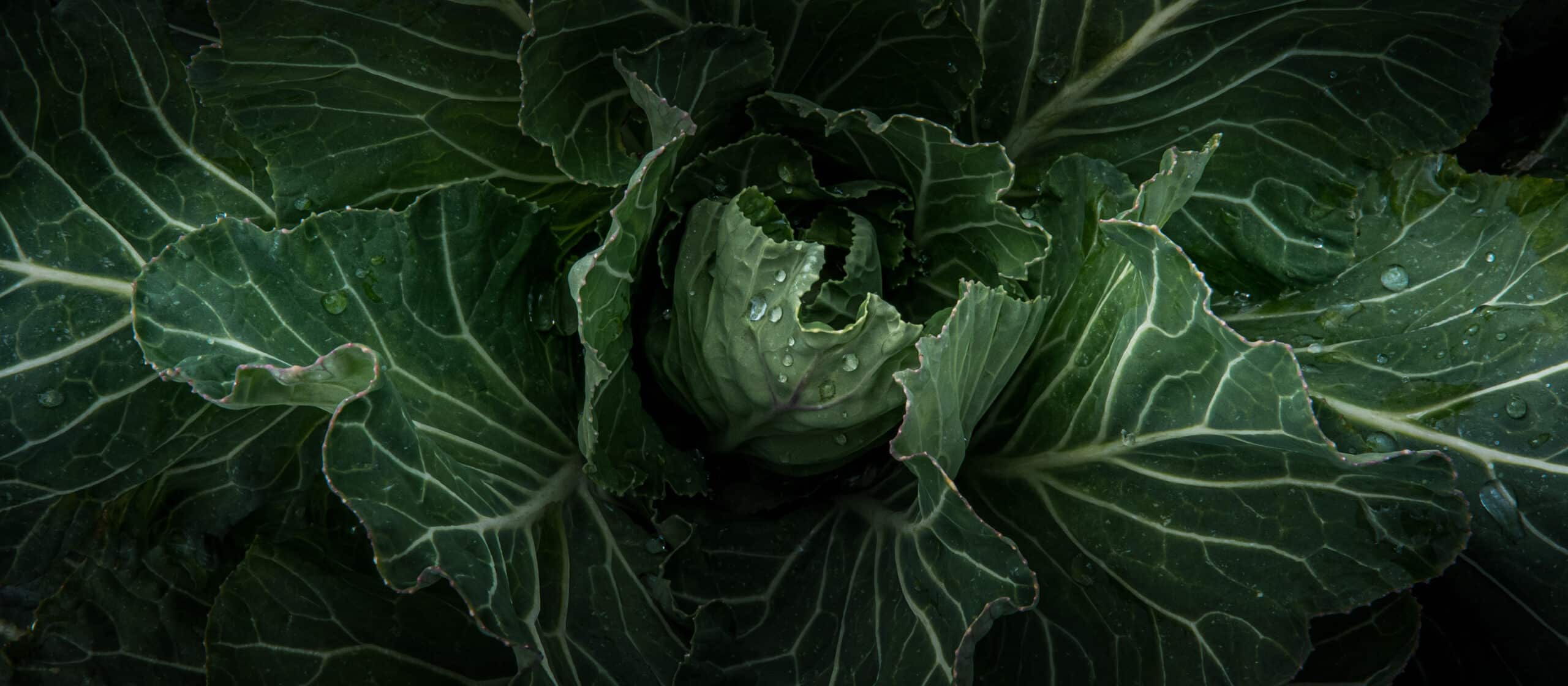
May Issue: Articles, Resources & Reads
May Issue: Articles, Resources & Reads
- posted on: May 7, 2020
- posted by: Robin Crowder
"*" indicates required fields

Hello all – Robin here. We hope you enjoyed the last issue of Resources & Reads. We continue to collect things that we may interest you. See below. As always, feedback is welcome. All of us at 21 Acres are sending you warm thoughts. In fact, if you follow us on social media you might have seen a lovely video message from Krystal, pictured here — dressed in a bee suit after tending to the apiary during a golden evening on the farm. Krystal has shifted from her full time work as our Volunteer Lead to a valuable assistant helping out in both the Farm Market and on the farm with Nan tending our bees. Krystal and the rest of us can’t wait to have you back just as soon as we can!
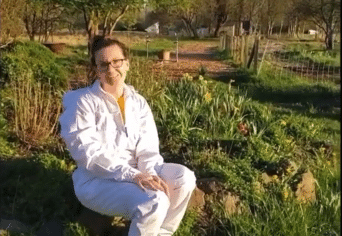
Cooking:
Sounds like many more folks are finding time to cook these days! Check out our blog for recipe ideas using local farm ingredient. You can sort by season and search by ingredient. Link
Making the most of frozen veggies
As you patiently await summer crops, this short video from Milk Street might interest you to learn how to turn frozen veggies such as broccoli into tasty, crisp flavorful dishes. Link
Which Yeast to Use
With everyone excited about baking, learn how to choose the best type of yeast for any recipe. Link
Teflon Pan Safety: What You Need to Know About Nonstick Pans, Link
Home cooks might be wondering where the truth about nonstick surfaces lies. It’s complicated — and in some ways, as you’ll see, infinitely simple.
Five Tips for Eco-Friendly Cooking from the New Flexitarian Cookbook “Eat Green,” Link
A book of easy and delicious recipes that advocates a more environmentally friendly way of cooking and eating, but also a book that recognizes that for some people and their families, cutting out dairy, fish and meat is unsustainable or unrealistic.
Dear God, the Dishes: Cooking Lessons from Self-Isolation, Link
The dishes never stop. There’s no such thing as enough produce. And, seriously, it’s okay if your meals aren’t perfect.
Try these twists on classic grilled cheese, Link
We bet they’d all be even better on Sonja’s Tafoni Bread that she sells through the Farm Market.
Backyard Gardening:
Local Gardening Advice Available from the Garden Hotline
It sounds like gardening is all the rage these days. If you have questions while working in your garden or even need help with how to get started, contact the good folks at the Garden Hotline which is sponsored by Tilth Alliance, among others. Their educators provide free advice to home gardeners and landscape professionals.
Radically Rural: To Build Climate Resilience, Every Backyard Matters, Link
How can you manage your path of the planet to best address climate change?
Why Compost Is Cheapest Irrigation System, Link
The bottom line is more organic matter means that the soil holds more water.
Panic buying chicks? Link
If the fear of running out of eggs has pushed you to start your own backyard chicken coop, there are a few things Purdue University professor Marisa Erasmus wants you to know.
Farm to School:
Have you been helping support your local school garden, or wondering about doing so once things return back to normal?
If so, check out the School Garden Support Organization Network, a national group focused on helping gardens thrive at schools.
Is your school or library providing meals for children, the elderly, or homeless?
Submit your school or library to this food distribution map, developed by Chef Jose Andres and World Central Kitchen. Once they identify areas where there are gaps in food access, they will go to those locations to help provide meals for those in need.
Climate Action:
Kelly Rankich, our facilities manager, turned us on to Zero Waste Wisdom. Wow, what an incredible resource!
We wanted to share with you and urge you to check out Jenica Barrett’s website. She has tips, tricks, and well-researched resources about how to minimize waste and lower your carbon footprint. Kelly is our own “zero waste guru” at 21 Acres and she said that Jenica’s book and movie reviews are spot on and include titles that we have in our lending library at 21 Acres. Kelly also mentioned that the website includes one of the best tutorials for making beeswax wraps. According to Kelly, she knows firsthand because she’s tried making the wraps multiple times and never got it right until finding Zero Waste Wisdom.
How Climate Anxiety Is Shaping Family Planning, Link
The notion of foregoing children as a means of fighting global warming is entering mainstream.
Social distancing measures have spawned a grand experiment in cities all over the United States, one that was once only imaginable in urbanists’ wildest dreams: the creation of new car-free zones.
Support Farmers:
Community Supported Agriculture (CSA) programs are an idea way to support farmers directly and to get glorious produce in return. There are many CSA’s in our area. Check out Tilth Alliance’s Fresh Guide to find a farm near you. If you’re hear in the Sammamish Valley, reach out to Sammamish Valley Alliance for a list of CSA farms.
Do you know about Farms for Life? Started right here, in the Sammamish Valley by Claire of the Root Connection, Farms for Life is a nonprofit that purchases food directly from farmers and donates it to local community groups that provide essential services for people.
Farming & Eating:
10 pioneer-era apple types thought extinct found in US west, Link
A team of retirees that scours the remote ravines and windswept plains of the Pacific Northwest for long-forgotten pioneer orchards has rediscovered 10 apple varieties that were believed to be extinct — the largest number ever unearthed in a single season by the nonprofit Lost Apple Project.
Economics:
Economics should reflect what really matters, Link
As we experience disruption on a scale not seen since the Second World War, people in Canada are taking note of what’s really important to them. That can lay the foundation for new ways of thinking about a better economy for tomorrow.
Researchers offer ways to address life under COVID-19, Link
New analysis outlines evidence-based approaches to combat bias and fake news, increase cooperation, and cope with stress and isolation.
Zero Waste:
“Bring your own container” rules moving forward, Link
Important changes allowing people to “bring your own container” as part of the state’s Food Safety Rules have been under consideration for the past year.
Self-Care:
10 Tiny Self Care Practices to Try Today, Link
Thankfully, there are little ways we can incorporate self-care into our current lives. And that’s important because self-care helps to boost our energy and our mood.
Watchlist:
Fantastic Fungi, Link
This movie earned 100% on Rotten Tomatoes – It’s a must see! This movie is not just for nerdy science geeks – everyone will love learning all about the mycelium under our feet.
Fishpeople, Link
Fish people is a film about the transformative effects of time spent in the ocean – and how we can leave our limitations behind to find deeper meaning in the saltwater wilderness that lies beyond the shore.
Farming & Regenerative Agriculture:
Kiss the Ground, Link
Do you know about Kiss the Ground? They’re an action-based nonprofit organization, working to increase societal awareness about the healthy benefits of soil. They offer online classes in many different subjects including gardening for all ages; they offer trainings and certifications; encourage advocacy and even fund soil testing for farmers. Learn more about Kiss the Ground.
Check out a new podcast from MOSES (Midwest Organic & Sustainable Education Service) focusing on the impact of the coronavirus pandemic on farmers (see the descriptions of the first 4 episodes below). Find the show wherever you get your podcasts or connect to it online here:
Episode 1: Market Farming in a Pandemic
Episode 2: Organic Grain & the Coronavirus
Episode 3: Farmer Mental Health in this Crisis
Episode 4: Produce Safety and COVID-19
Coronavirus:
The Coronation by Charles Eisenstein, Link
As Covid stirs our compassion, more and more of us realize that we don’t want to go back to a normal so sorely lacking it. We have the opportunity now to forge a new, more compassionate normal.
The Coronavirus Is Making Public Discourse Sick, Link
When it comes to Coronavirus, the climate emergency or any other disaster, we shouldn’t antagonize; rather, we should empathise. If we learn to see beyond the tips of our noses and adopt a global empathy, we’ll be able to tackle this virus — and the even bigger crisis of the climate emergency.
Emergency Covid Food Policies: Can They Become Permanent Reform? Link
Rapid-fire, emergency funding could lead to more lasting, broad-reaching reform once life returns to normal, whatever “normal” looks like post-coronavirus.
How long does the coronavirus live on surfaces like cardboard, plastic, wood, and steel, Link
The lifespan of the virus on a given surface depends on myriad factors, including the surrounding temperature, humidity, and type of surface.
Social Connections:
From watching reruns to relationships, there are many ways of feeling connected, Link
New research suggests that non-traditional social strategies, which can include so-called ”guilty pleasures,” are just as effective at fulfilling critical social needs as family connections, romantic relationships or strong social support systems. The study represents the first-time researchers have empirically combined the traditional and non-traditional for comparative purposes to simultaneously test their relative effectiveness
Food Systems:
Food Distribution 101: What Happens When the Food Supply is Disrupted by a Pandemic, Link
As farmers are forced to dump food and food banks are struggling to feed millions, an explainer on U.S. food supply and distribution.
Could Washington Become The New California In Vegetable Production? Link
That’s the question a recent Journal article penned by a Washington State University PhD candidate tried to answer.
Interesting Hodgepodge:
Here’s a hodgepodge collection of articles that we found interesting and hope you do too:
Mahogany tree family dates back to last hurrah of the dinosaurs, Link
A new article shows the mahogany family goes back to the last hurrah of the dinosaurs, the Cretaceous.
A gut-to-brain circuit drives sugar preference and may explain sugar cravings, Link
The sensation of sweetness starts on the tongue, but sugar molecules also trip sensors in the gut that directly signal the brain. This could explain why artificial sweeteners fail to satisfy the insatiable craving for sugar.
Tools to help volunteers do the most good after a disaster, Link
In the wake of a disaster, many people want to help. Researchers have now developed tools to help emergency response and relief managers coordinate volunteer efforts in order to do the most good.
Just for Fun:
Very good dogs don’t necessarily make very good co-workers, Link
Because of the COVID-19 pandemic, many of us are working from home in close proximity to our human children or fur babies.
Beautiful and Moving:
This is a must watch video from Juilliard no matter whether you’re a an arts patron or not. It’s very beautiful and moving.
21 Acres in the News:
The Woodinville Weekly featured 21 Acres on the home page: Support Farmers and the Environment from Home.Thank you also to 425 Magazine for the recent shout out for the Farm Market.











 back to blog overview
back to blog overview

